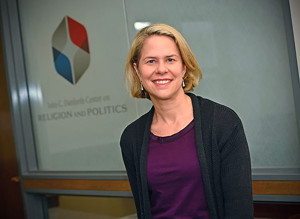
While it may seem bizarre for an American presidential candidate to describe the comments of a sitting pope as “disgraceful,” Donald Trump’s recent attacks on Pope Francis should come as no surprise from a candidate whose success hinges on playing to the fears of religiously inspired voters, suggests an expert on evangelical politics at Washington University in St. Louis.
“Donald Trump’s recent slam at Pope Francis is perfectly consistent with the persona he has exhibited throughout his campaign (and well before),” said R. Marie Griffith, professor of humanities and director of the John C. Danforth Center on Religion and Politics.
“His comments are calculated to build his following among several subsets of religiously inspired voters,” Griffith said, “including those conservative Catholics who spurn the Pope’s message about economic justice, evangelicals who think no one should presume to know another person’s heart or question their faith, and anti-Catholic fundamentalists who still associate the Pope with the Antichrist.”
Trump’s harsh rebuttal of comments by Pope Francis offers yet another example, Griffith said, of his campaign’s ability to gain support by appealing to deep-seated fears held by many white Protestants, including a powerful distrust of religious or ethnic “others,” particularly Muslims. This fear, she said, has long manifested itself in white Protestant concerns about Catholicism and Catholic power, especially any perceived papal influence on American politics.
Griffith, the author of several books on religion and politics, makes the case that many religious and political leaders have consistently railed against the dangers of sexual sins and temptations because it has been effective in stirring up fears and galvanizing Americans to social and political action.
“Whatever the specific issue — birth control, censorship, interracial sex, female unchastity outside marriage, sex education, abortion or homosexuality — certain American religious and political leaders have framed it in terms of fear,” Griffith said. “Above all, Trump and other conservative politicians have found success by appealing to a widespread and easily stoked fear across much of the American populace that America itself is in an irreversible decline, due largely to the activities of some of its own citizens — the enemy within, shredding the sacred fabric binding together a God-blessed nation. Trump’s campaign is a perfect example of how such fears can be used to gain and build political momentum.”
While many progressive religious voters may view Trump’s latest comments as confirmation that he is unfit for the nation’s highest office, his remarks are likely to resonate with an important subset of the Republican electorate, Griffith said.
“A lot of religious folk have already made up their minds, and conservative Christians who remain first and foremost ‘family values’ voters may still prefer Ted Cruz or Marco Rubio,” she said. “But it appears that more and more voters in that religious camp have decided that the nation needs a fearless leader to trigger a transformative day of reckoning, and Trump’s latest affront may seem more proof that he’s the one.”